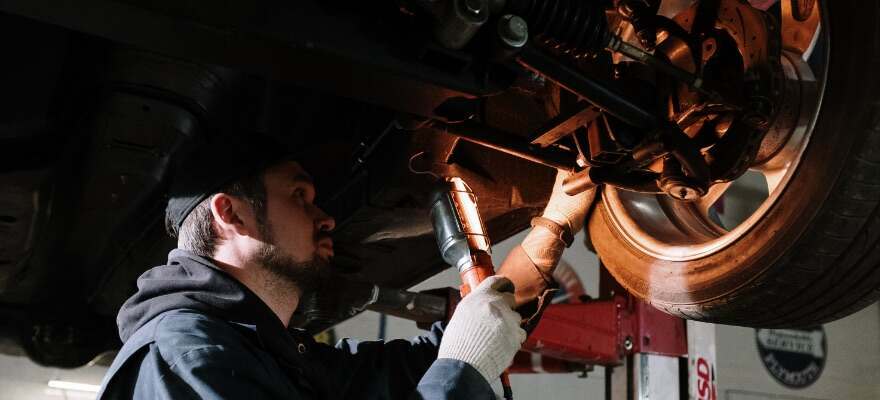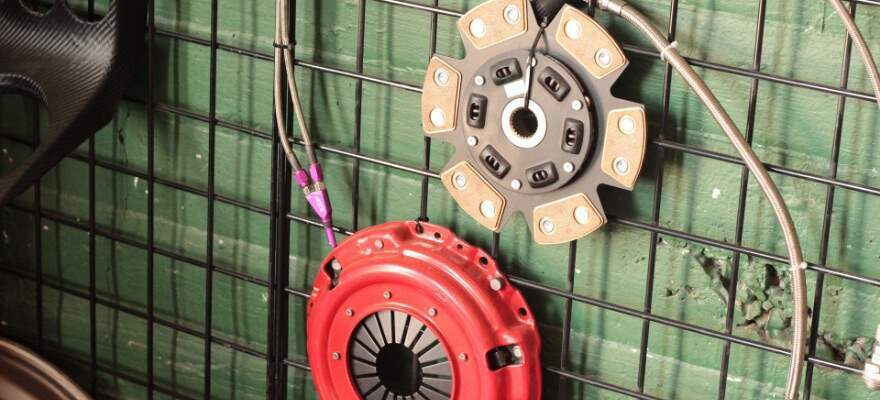Don't Know What You Got 'Til It's Gone
We're not sure if Cinderella was singing about a bad clutch or an empty can of Aqua Net back in 1988, but the adage holds true, regardless. When you're cruising through town, accelerating hard and banging through the gears for maximum performance, you're probably paying more attention to your car's kickass engine roar and exhaust growl than how your clutch is performing. It's understandable; the clutch isn't exactly the sexiest part of your car's anatomy. But when it goes, you'll be painfully aware of its vital importance to your driving experience. And here's a sad fact of car ownership: Your clutch is dying a little bit each time you drive, and some day it will need to be replaced. Estimates vary based on the quality of parts and style of driving, but your clutch should last anywhere from 40,000 to 100,000 miles.
Some general awareness of what's going on inside your car can teach you how to tell if you need a new clutch and allow you to prepare (i.e., save your damn money) for the day when you WILL need to replace this important component.

1. Pedal Is Too Soft or Too Hard
We don't want to bog you down with too much of what's going on behind the scenes, but a soft clutch pedal is a prime symptom that things are no bueno for your ability to shift gears. In fact, any weirdness with the feel and resistance in your pedal are signs your clutch is going out. It might feel spongy, the pedal may vibrate when you engage/disengage, maybe suddenly it requires more effort than usual; whatever it is, it's not good. These are all signs of a bad clutch that you should get checked out pronto.
2. Different Bite Points
When you release your clutch, you feel it bite when the transmission engages. You know what it feels like when it's right. So any differences in how it's supposed to feel are signs of clutch failure. Typically, the bite point for a good-working clutch is somewhere near the center of the pedal's travel. As a clutch wears, that bite point gets higher and higher, and sometimes you won't feel the transmission grab until the clutch pedal is all the way out. This is bad news.
3. Can't Get It In Gear
If you bought your car new (or if it had a new transmission and clutch), you know the smooth operation of a properly functioning clutch. The bad clutch symptoms we're talking about here are the polar opposites of smooth. Proper shifting shouldn't require a lot of elbow grease. This is especially true if you have the pedal fully depressed and can't find the gear. If you're needing to exert excess force just to get your car into gear, that's a warning sign that your clutch could be on its way out.

4. Can't Find Reverse
Similar to symptom No. 3, sometimes a bad clutch will make it near impossible to shift into reverse. Mechanically, switching into reverse puts a heavy burden on your car's transmission and drive shaft, as it's forcing the vehicle's power to shift in the opposite direction. This is one of the hardest functions a clutch performs, so it's often an early-warning sign that something is going wrong.
5. Slipping
This is one of the most common warning signs of clutch failure because it is so noticeable and so incredibly annoying that it can't be ignored or dismissed. You'll be painfully aware of a slipping clutch because you'll put your foot on the gas and the engine will rev up, but your car will not accelerate like you're used to, or at all.
Possibly, you might not be able to shift at all, or your transmission will seemingly shift but then "fall" back into the gear you were shifting from. This is because the clutch is either not engaging or disengaging properly, and it's a telltale sign that you're going to need to replace that bad boy sooner rather than later.
6. Grinding
An audible grinding sound when you attempt to shift gears could be a sign that you don't know how to drive stick, you knucklehead. But we know you. We know that you're visiting Lethal Performance because you care about cars and know how to drive. So that horrendous metal-on-metal sound must be a bad clutch. Seriously, if you're experienced at driving a manual transmission, trust your ears. If you hear some weird shit going on under your car, take it to your mechanic.
7. Burning Smell
This is the evil twin to Symptom No. 6. It's so obviously a problem that we almost feel silly even bringing it up. Buuuuut, we're bringing it up. If you smell something burning (anywhere) in your car, for the love of God, check it out. It may or may not be a bad clutch, but regardless, it's not good. Always better to be safe than sorry.
Bad Clutch Symptoms? Upgrade Your Ride with Parts From Lethal Performance
Now that you know how to tell if your clutch is bad, we're going to tell you how to get your car back up and running like new (or better)! Lethal Performance has the right OEM and high-performance aftermarket parts for your car. Whether you're seeing signs of a bad clutch or simply want a performance upgrade, we've got you covered. Browse our giant selection of performance parts and other aftermarket upgrades like our Ford Mustang wheels and rims and Mustang turbocharger kits today!
Shop Lethal Performance

